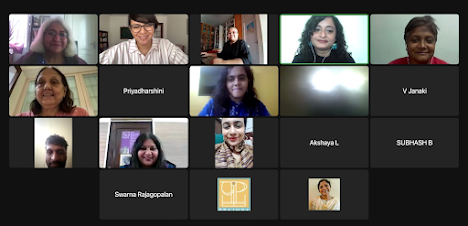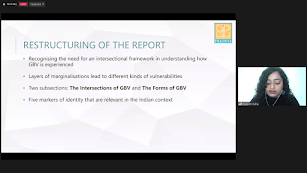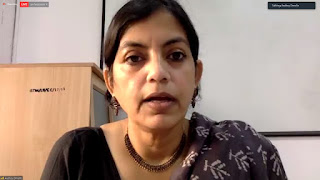We are delighted to launch the 2022 Prajnya Gender Violence in India Report (GVR), on the first day of the 2022 Prajnya 16 Days Campaign Against Gender Violence. For the launch of this year's GVR, we had with us, Kausumi Saha (author-curator of the 2022 GVR) and Dr. Saumya Uma (Professor, Jindal Global Law School). The session was moderated by Dr. S. Shakthi. You can watch a saved copy of the recording here.
Kausumi Saha, works as a Researcher and Project Coordinator at Gender at Work. She has a Master's degree in Sociology from the Delhi School of Economics and is currently working towards a second postgraduate degree in Psychology. Her research interests lie in the intersections of media, youth subcultures, gender, identity formation, and mental health. This is Kausumi's third year working on Prajnya's Gender Violence in India report.
- "The 2022 Prajnya Gender Violence in India Report takes stock of the state of gender violence in India using definitions, statistics (where available), and highlights of recent cases of gender-based violence that have appeared in the news."
- "Intersectionality is a framework that recognizes women are not a homogenous category and that they do not experience violence the same way...Keeping that in mind, and in our quest to make the report more intersectional, we have restructured the report very differently this year."
- "Part I of the Report: The Intersections of Gender-Based Violence presents an overview of five markers of identity that are relevant in the Indian context: caste and indigenous identities; queerness; old age; disability; and the experiences of religious minorities"
- "Dalit and Adivasi women face violence from the oppressor caste due to their caste/indigenous status and their gender and within their own community due to their gender identity. This is called double marginalisation. Additionally,
- all kinds of gender-based violence have an element of power attached to them. When we look at violence against Dalit and Adivasi persons, it is a demonstration of power and a weapon to reinforce the existing structural hierarchies."
- "There is also a large amount of symbolic violence that the queer population faced. This is in the form of non-recognition of their queer identities like the usage of wrong pronouns or deadnaming queer individuals."
- "There is little to no research on sexual violence against elderly women due to the shame and the stigma associated with it."
- "Women with disabilities are often financially and socially dependent on others for their survival and the perpetrators of violence are often caregivers, present either at homes or in institutional settings."
- "We have seen that any kind of large-scale communal violence is almost always accompanied by an aspect of sexual violence."
Dr. Saumya Uma, professor at Jindal Global Law School and the Director, Centre for Women's Rights (JGLS) followed Kausumi's presentation with a talk on the report. Prof. (Dr.) Saumya Uma is a Professor at Jindal Global Law School and heads its Centre for Women’s Rights. She has over 28 years’ combined work experience as an academic, law researcher, lawyer, trainer, writer and campaigner on gender, law and human rights. She has served as a research consultant on human rights, with international agencies such as the United Nations Development Fund (UNDP), United Nations Office of the High Commissioner on Human Rights (UNOHCHR) and the International Commission of Jurists (ICJ). Additionally, she worked as the National Coordinator of ICC-India: the anti-impunity campaign on International Criminal Court and its relevance to India – from 2000 to 2010. Dr. Uma teaches and researches at the intersection of gender, human rights and the law. In particular, she writes on feminist jurisprudence; international criminal justice and its relevance to India; victim and witness protection; justice and accountability for mass crimes; South Asian women’s movements and the feminist envisioning of justice; human rights law and lawyering; gender-based violence and reparative justice; access to justice; social exclusion and marginalization; clinical legal education; and feminist pedagogy.
- "One of my first observations is on the aspect of Kidnapping and Abduction of Women and Girls...If we look at the 2020 and 2021 statistics, we see a significant increase in the Kidnapping and Abduction of Women and Girls, and in the Kidnapping and Abduction of Women to compel her for Marriage.....Partly, this increase (in reported cases) could be due to the increased incidence of kidnapping and abduction, but there may also be cases of more inter-caste and inter-religious marriages or lesbian couples leaving homes which the parents register under complaints of abduction."
- "Despite all the propaganda, resistance and the institutional reluctance to register complaints of domestic violence, there is still a sizeable number that is getting registered...In the covid years, when women were trapped in their homes because of lockdowns and working from home, worldwide, domestic violence increased during those years. So, the 2022 statistics are likely to show this kind of increase."
- "There are forms of cyber-stalking which are not only by strangers but also by partners. I think this is just increasing the violence that takes place. We need to remember that stalking, rape and murder are all quite linked and there are many cases where stalking, when not stopped or prevented, has led to rape and murder."
- "For women who were working from home, colleagues were contacting them through cyberspaces. There were forms of sexual violence at workplaces that call for the expansion of the definition of workplace to include homes as well."
- "We need to look at domestic violence, intimate partner violence, patriarchy, misogyny, Indian masculinity, and the everyday violence that women are facing in relationships. I see and hear of these from my students as well. We think that the younger generation is very liberated in some sense, but they too are in the same trap of patriarchy and misogyny to a large extent."
- "It is important to look at the violence inflicted on transgender women, lesbian women, gender non-confirming individuals, gender non-binary individuals...The kind of shame, stigma and institutional apathy against them is so much more, and yet it is undocumented."
- "There are limitations in the law. The law is slow to catch up and the interpreters of the law are much slower to catch up with what is happening. So, while the law may be a part of the solution, what is really needed is social consciousness and political action."






